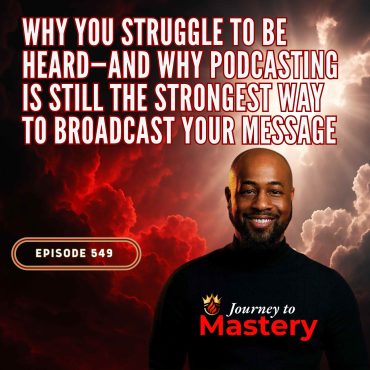
The West African Coast, the Negro Adapts to Christianity, European Immigrants
Our Scripture verse for today is Philippians 1:29 which reads: “For unto you it is given in the behalf of Christ, not only to believe on him, but also to […]
 play_arrow
play_arrow
Dreaming Of Your Wife – 1.26.26 podcast
 play_arrow
play_arrow
MY EXPERT OPINION EP #17- METHOD MAN RETURNS TO TALK “RELATIONSHIP GOALS”, HOLLYWOOD, WU-TANG + MORE podcast
 play_arrow
play_arrow
 play_arrow
play_arrow
#3544: How To Mentally And Emotionally Detach From The Moment podcast
 play_arrow
play_arrow
The After Effects of a Breakup podcast
 play_arrow
play_arrow
 play_arrow
play_arrow
 play_arrow
play_arrow
 play_arrow
play_arrow
 play_arrow
play_arrow
Family First: Became a teen father and took his son with him to college at Florida A&M University. podcast

Our Scripture verse for today is Matthew 20:17-19 which reads: “And Jesus going up to Jerusalem took the twelve disciples apart in the way, and said unto them, Behold, we go up to Jerusalem; and the Son of man shall be betrayed unto the chief priests and unto the scribes, and they shall condemn him to death, And shall deliver him to the Gentiles to mock, and to scourge, and to crucify him: and the third day he shall rise again.”
Our History of Black Americans and the Black Church quote for today is from Lee June, a professor at Michigan State University and the author of the book, “Yet With A Steady Beat: The Black Church through a Psychological and Biblical Lens.” He said, “The Black pastor has historically been and in many cases continues to be preacher, poet, exhorter, teacher, ‘social worker,’ ‘psychologist,’ businessperson, politician, orator, civil rights leader, and community organizer. Hamilton stated: ‘Black preachers have always been pacifiers, passive resisters, and vigilantes. And each type has had, and continues to have to this day, substantial following in the black communities. They have this in common: They have all been leaders of their people—people needing comfort, instruction, encouragement and guidance. At some point during slavery, the various preachers filled, in their own ways, these needs.'”
In this podcast, we are using as our texts: From Slavery to Freedom, by John Hope Franklin, The Negro Church in America by E. Franklin Frazier, and The Black Church In The U.S. by William A. Banks.
Our first topic for today is titled “The African Way of Life — Political Institutions, Part 1” from the book, “From Slavery to Freedom” by John Hope Franklin. We are going to look at the West African Coast and European Merchant-Traders.
It is obviously impossible to make very many generalizations concerning the way of life in a continent as large as Africa, with so many variations in climate, physiography, and population. As in any other area, at any other time, Africa presents variations in degrees of civilization that run the entire gamut from the most simple to remarkably advanced ones. At this point little more can be done than to observe various aspects of the African way of life with a view to understanding more adequately the cultural heritage of these people who have come to claim the concern of Europeans and Americans in recent centuries. If the emphasis here appears to be placed on the way of life in West Africa, it is because there seems to be merit in trying to secure as intimate an understanding as possible of the area in which the bulk of the people lived who later became the black workers of the Americas.
…
Our second topic for today is “The Negro Adapts Christianity to His Experience in the New World, Part 2” from The Negro Church in America by E. Franklin Frazier. He writes:
On the Sea Islands off the coast of South Carolina and Georgia where the slaves were most isolated from whites, some of the Negro Spirituals reveal some continuity with their African background. This continuity is to be found especially in what has been called the Afro-American shout songs. These shout songs are so named because they were sung and are still sung while the Negro worshippers are engaged in what might be called a holy dance. This may be regarded as an example of the most primitive and elemental expression of religion among American Negroes. Moreover, it provides an excellent illustration of Marett’s contention that primitive man “does not preach his religion, but dances it instead.”
…
Our third and final topic for today is from “The Black Church in the U.S.: Its Origin, Growth, Contributions, and Outlook” by William A. Banks. Today we are looking at the section titled, “Little Progress Made in the Evangelism of the Slaves”
In these early days of slavery, Christianity made little progress among the slaves. First, it was only natural that the new arrivals were slow to break away from African rituals that were a part of their former way of life. Second, the slaves’ general interest in religion was slight, and very little was done to encourage them to become Christians even though “Christianizing” them was one of the earliest justifications given by Europeans for the slave trade. Failure to evangelize was in part traceable to the low spiritual state of the Whites themselves. There simply were no strong evangelical churches in America at the time.
…

Our Scripture verse for today is Philippians 1:29 which reads: “For unto you it is given in the behalf of Christ, not only to believe on him, but also to […]











Copyright Blackpodcasting 2025